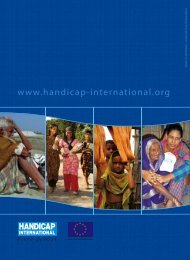Full page photo print - Harvard Law School Project on Disability
Full page photo print - Harvard Law School Project on Disability
Full page photo print - Harvard Law School Project on Disability
You also want an ePaper? Increase the reach of your titles
YUMPU automatically turns print PDFs into web optimized ePapers that Google loves.
Violati<strong>on</strong>s of other human rights can create additi<strong>on</strong>al barriers to people with disabilities being<br />
able to fully enjoy their right to work. For example:<br />
• The lack of accessible transportati<strong>on</strong> may deprive people with disabilities of their ability<br />
to access places of employment;<br />
• The lack of access to educati<strong>on</strong> and to access vocati<strong>on</strong>al and other training<br />
opportunities may leave people with disabilities unable to meet specific job<br />
qualificati<strong>on</strong>s, and may also restrict their earnings potential;<br />
• The lack of opportunity to live independently and in the community may force people<br />
with disabilities to live in segregated instituti<strong>on</strong>al settings, where access to meaningful<br />
work opportunities may be n<strong>on</strong>-existent or greatly restricted;<br />
• The lack of access to health care services may leave people with disabilities in poor<br />
health and as a result unable to work; and<br />
• The lack of access to informati<strong>on</strong> may make it difficult for people with disabilities to<br />
become aware of job postings and other informati<strong>on</strong> about potential employment.<br />
Violati<strong>on</strong>s of the right to work may also lead to violati<strong>on</strong>s of the enjoyment of other human<br />
rights by people with disabilities. For example, a disabled pers<strong>on</strong> who is unable to work and<br />
earn a fair wage may be unable to attain an adequate standard of living. This circumstance,<br />
in turn, may force that pers<strong>on</strong> to become dependent up<strong>on</strong> others, restricting choices and<br />
curtailing the ability to live independently in the community. In many cases, people with<br />
disabilities who are unable to financially support themselves can become trapped in a cycle of<br />
poverty, and unable to meet even their most basic needs for food, water, clothing, and shelter,<br />
or indeed raise a family as they would wish. In some countries employment provides a means<br />
of accessing the health insurance needed to obtain health care services. Where people with<br />
disabilities are unable to obtain employment in such countries, their access to health care<br />
services may also be restricted.<br />
Perhaps the most far-reaching impact of the denial of the right to work is <strong>on</strong> a pers<strong>on</strong>’s sense<br />
of dignity and self-worth. In many societies, the ability to work is comm<strong>on</strong>ly viewed as <strong>on</strong>e of<br />
the most important ways in which people can make their individual c<strong>on</strong>tributi<strong>on</strong>s to society,<br />
and those perceived as unable or unwilling to work may be viewed as less valuable members<br />
of that society, especially when their inability to earn a living causes them to become reliant<br />
<strong>on</strong> the support of the government or others. Thus, full enjoyment of the right to work can be<br />
of critical importance in the full inclusi<strong>on</strong> of people with disabilities as equal members of the<br />
societies in which they live, as well as in the self-image and sense of self-worth that people<br />
with disabilities have of themselves.<br />
140 hUmAn RighTs. yes! AcTi<strong>on</strong> And AdvocAcy <strong>on</strong> The RighTs of PeRs<strong>on</strong>s wiTh disAbiliTies




